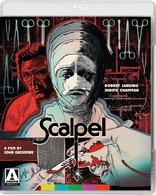Scalpel Blu-ray Movie
HomeScalpel Blu-ray Movie 
False FaceArrow | 1977 | 95 min | Not rated | Feb 20, 2018
Price
List price:Amazon: $19.99 (Save 50%)
Third party: $19.99 (Save 50%)
Only 5 left in stock (more on the way).
Movie rating
7 | / 10 |
Blu-ray rating
| Users | 0.0 | |
| Reviewer | 3.0 | |
| Overall | 3.0 |
Overview
Scalpel (1977)
A psychopathic plastic surgeon transforms a young accident victim into the spitting image of his missing daughter.
Starring: Robert Lansing (I), Judith Chapman, Arlen Dean Snyder, David Scarroll, Sandy MartinDirector: John Grissmer
| Psychological thriller | Uncertain |
| Thriller | Uncertain |
| Crime | Uncertain |
| Drama | Uncertain |
Specifications
Video
Video codec: MPEG-4 AVC
Video resolution: 1080p
Aspect ratio: 1.85:1
Original aspect ratio: 1.85:1
Audio
English: LPCM Mono (48kHz, 24-bit)
BDInfo
Subtitles
English SDH
Discs
Blu-ray Disc
Single disc (1 BD)
Playback
Region A (B, C untested)
Review
Rating summary
| Movie | 3.0 | |
| Video | 4.0 | |
| Audio | 4.0 | |
| Extras | 3.0 | |
| Overall | 3.0 |
Scalpel Blu-ray Movie Review
Face/Off.
Reviewed by Jeffrey Kauffman February 24, 2018Ho hum. Another day, another film with someone getting their face removed (one way or the other). There was some frankly pretty gruesome imagery in the (very) recently reviewed The Sect featuring just such a plot conceit, and lo and behold, here it is again (one way or the other) in Scalpel, a rather interesting 1977 opus from writer and director John Grissmer, who is perhaps better remembered for a horror film he made a decade after Scalpel, 1987’s Blood Rage. Scalpel may purport to be a horror film, and it certainly has some more or less traditional elements that would probably accurately classify it as such, but in other ways, it’s more of a psychological character study with horror underpinnings, one that benefits from an unusual tone and (in its original version at least — more about that later) a fascinating style that subliminally suggests a Southern Gothic ambience courtesy of director of photography Edward Lachman, Jr.’s honey colored cinematography. The plot mechanics of Scalpel are actually fairly rote, despite a couple of relatively distinctive sidebars, with a crazed plastic surgeon named Phillip Reynolds (Robert Lansing) who attempts to cash in on an inheritance meant for his long missing daughter by simply giving a badly injured "working girl" he rather conveniently finds lying in a street the face of that daughter. Psychological if not outright physical mayhem ensues, especially when the girl, whom is known only as Jane Doe (Judith Chapman), spends a considerable amount of time and energy not just adjusting to her “new, improved” face, but also to the demands of passing as Reynolds’ daughter Heather. Perhaps unsurprisingly, Heather (Judith Chapman) returns as a more or less prodigal daughter, leading to yet more conniving and manipulation as Reynolds has to decide how to handle this rather bizarre ménage à trois.
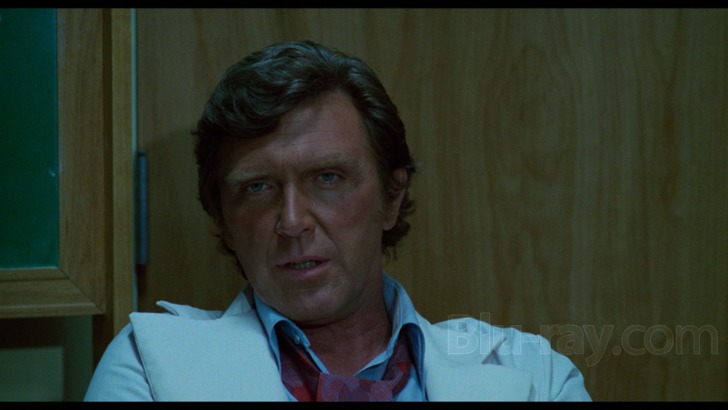
There are a number of plot holes running rampant through Scalpel that probably deprive it of ever attaining much real impact, not the least of which is Reynolds simply more or less stumbling across Jane Doe just when he needs her. But even the main gambit of reshaping Jane to become Heather is kind of ridiculous, since Reynolds brings the horribly disfigured girl to the hospital where he works in order to “heal” her. That would seem to make Reynolds’ supposedly “top secret” plan to have Jane become Heather kind of public knowledge (so to speak), but Scalpel just more or less keeps on keepin’ on, not worrying about such “minor” issues. It’s perhaps interesting to contrast these plot mechanics with another film with someone forced to impersonate a lookalike, another 1987 film called Dead of Winter (a more or less remake of 1945’s My Name Is Julia Ross), where everything is handled in an isolated environment away from prying public eyes.
As ludicrous as some of the plotting unavoidably is, a lot of the foregoing fits more or less squarely into established horror tropes, with the mad doctor trying to create a “wonder woman”, Pygmalion style, only to have a series of obstacles (not solely limited to the appearance of Reynolds’ actual daughter) accrue. But what perhaps really sets Scalpel apart is an underlying squalid feeling that is perhaps most evident when Reynolds and Jane embark on something more than merely playing at being father and daughter. It’s here the film really tips over into something decidedly more fetid and disturbing, helped by solid (if kind of winking) underplaying by Lansing and Chapman.
Things do tend to go a little gonzo once Heather (re)-enters the picture, with a climax that probably tries a bit too hard for “twist” territory, but which ends up making an already contrived plot seem positively unbelievable. That said, as patently ridiculous as much of Scalpel undeniably is, it benefits from a rather unusual ambience, one that is supported by some equally unusual choices by Lachman for his original version of the film.
Scalpel Blu-ray Movie, Video Quality 
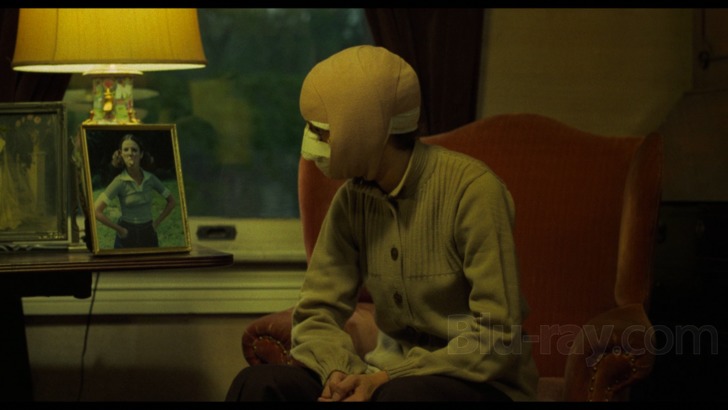
Scalpel is presented on Blu-ray courtesy of Arrow Video with an AVC encoded 1080p transfer in 1.85:1. Arrow's insert booklet has the following information on the transfer:
Scalpel was exclusively restored by Arrow Films and is presented in its original 1.85:1 aspect ratio with mono sound.I kind of wondered (with mental tongue firmly in mental cheek) if there was some kind of backroom meeting at Arrow with regard to the Lachman grading, with some concerned executive insisting that some dunderheads would insist it was "incorrect", perhaps with thoughts of the "blue" Night of the Living Dead that, like this release, even had the imprimatur of one of the creators. That said, while rather odd looking at times, the Lachman grade does suffuse the film with a kind of subliminal visual "subtext" that skews everything weirdly, whether or not one feels the yellow-green tints are somehow inherently evocative of a "Southern Gothic" feeling. That said, the Lachman grading does tend to tamp down detail levels, especially in some of the darker moments, some of which become relatively hard to see, especially when compared to the "Arrow grade". Considering the source element, though, detail levels are generally excellent, especially in more brightly lit close-ups. Grain also looks natural and encounters no compression issues. For the record, screenshots 1 - 15 are from the Lachman grading, which (as a kind of purist) I consider the "real" look for this film. Screenshots 16 - 19 offer a few views of the Arrow grading, and I've tried to come close to recreating a couple of frames from both versions in these screenshots so that those interested can do a side by side comparison to see the variances on display.
Although subject to an extensive search, the original 35mm camera negative for Scalpel could not be located. The best available film element was a 35mm colour reversal internegative (CRI), which was scanned in 2K resolution at OCN Labs, Connecticut. The film was graded and restored at R3store Studios, London. Thousands of instances of dirt, debris, scratches and other instances of film wear were repaired or removed through a combination of digital restoration tools and techniques.
Scalpel is presented on this release in two different colour graded versions, both from the same restored materials.
Director of photography Edward Lachman shot Scalpel with a "Southern Gothic" look in mind, containing strong warm tones with an intentional emphasis on yellows and greens. Lachman supervised and approved the grading for this version, which represents this stylistic look as intended.
The second version presents the film in a more traditional grade, and is included here for comparative purposes.
The original mono soundtrack was remastered at Deluxe Audio Services. Some instances of synch appear loose, in keeping with the post-dubbing used in some sequence in the original production.
All materials for this restoration were made available by IWC and Technicolor Labs.
Scalpel Blu-ray Movie, Audio Quality 
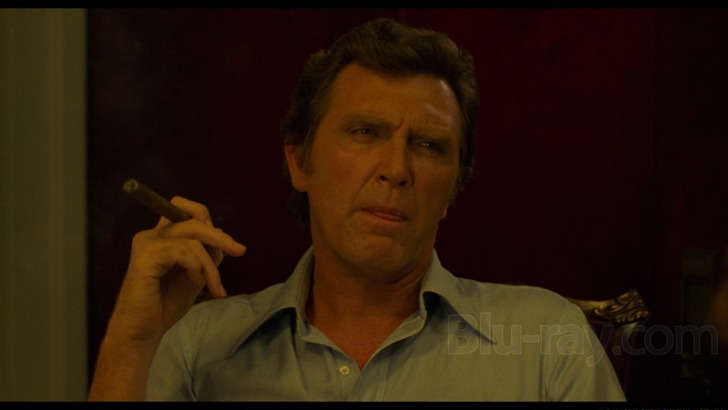
Scalpel's LPCM mono track capably supports what is in essence largely a dialogue driven affair, though Robert Cobert's score also resonates with fine fidelity. There's not a lot of depth to this track, but there are no discernable issues with anything like distortion or dropouts.
Scalpel Blu-ray Movie, Special Features and Extras 
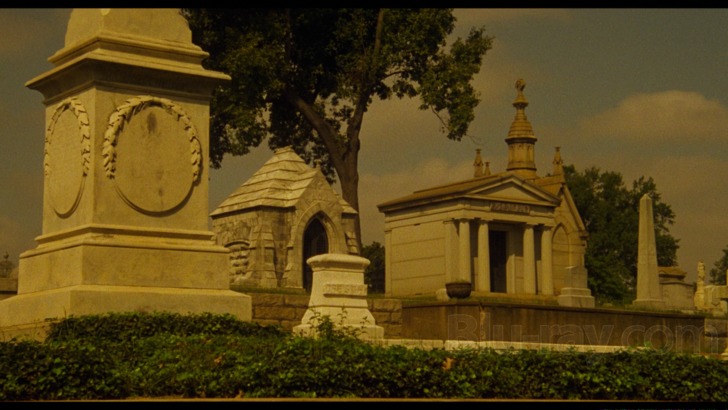
- Two Versions are presented, one featuring the original and somewhat unusual color grading designed by director of photography Edward Lachman, and a second, new grading that some might consider more "normal" looking, done expressly for this release by Arrow. See screenshot 20 for some details which are offered on the disc's Main Menu.
- Introduction by Director (1080p; 00:31) offers John Grissmer with a brief welcome. This is found under the Play Film menu and is authored to be directly followed by the film itself.
- The Cutting Edge (1080p; 13:52) is a new interview with John Grissmer, who genially discusses this film and other aspects of his career.
- Dead Ringer (1080p; 17:20) is a new interview with Janet Chapman, who talks about the fun and challenge of playing two roles.
- Southern Gothic (1080p; 15:25) is an interesting (new) interview with director of photography Edward Lachman, who gets into some of the stylistic choices he made for the film.
- Image Gallery (1080p; 3:31)
- Trailer (1080p; 2:42)
- Audio Commentary features Richard Harland Smith.
Scalpel Blu-ray Movie, Overall Score and Recommendation 
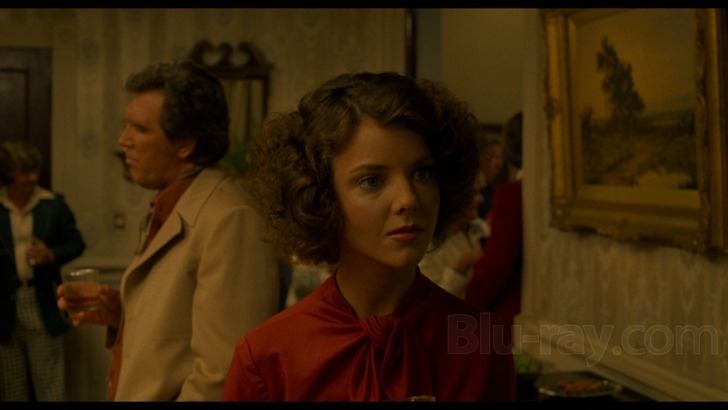
Scalpel's horror tendencies are a bit on the creaky side, but the film itself is suffused with such a bizarre sensibility, especially with regard to the quasi-incestuous relationship that develops between Reynolds and Jane, that those very "horror" elements almost become less important. This is one of those releases where the actual feature has debatable worth, but where the presentation and supplements may offer some unexpected allure. Technical merits are generally strong and the supplemental package very enjoyable for those considering a purchase.
Similar titles
Similar titles you might also like

Child of God
2013

Libido
1965

Strange But True
2019

The Marsh King's Daughter
2023

Dementia 13
Director's Cut
1963

The Nanny
1965

Hounds of Love
2016

Marrowbone
The Secret of Marrowbone
2017

Blood on Her Name
2019

Paranoiac
Collector's Edition
1963

Endless Night
1972

Crimes at the Dark House
Indicator Series
1940

The Perfect Host
2010

Trapped
2002

The Lodge
2019

A Cure for Wellness
2016

The Hand That Rocks the Cradle
1992

Maniac
1963

Raising Cain
Collector's Edition
1992

Brawl in Cell Block 99 4K
2017
